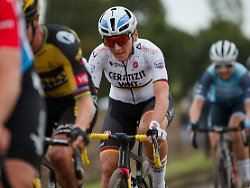Friday October 22, 2021
“Positive development”, but …
Women are belittled in cycling
300 euros in prize money – not for one cyclist, but for the whole team – and that in a professional race. The importance of cycling for women is still low, but the achievements are impressive. At least the vicious circle can be slowly broken.
The humiliation came at the very end. In the pilgrimage town of Santiago de Compostela, everything was ready for the grand finale of the Vuelta for professional cyclists: a target arch, spacious barriers and the large cathedral as a magnificent backdrop. And the women? They had to turn off beforehand and crossed their target line at an unadorned bus stop. This is what track cycling Olympic champion Mieke Kröger told Deutschlandfunk these days. “You really feel like an appendage,” said the 28-year-old. It’s a feeling that has prevailed in women’s cycling in recent years.
Kröger is, like teammate Lisa Brennauer, an all-round winner, in 2021 alone there were gold medals at the Olympics, European Rail Championships, Rail World Championships and Road World Championships. But women’s cycling is still far from having general relevance. “I hope for more presence. Some now know this strange foursome from Tokyo, who set three world records there. I hope that women’s cycling in general will come into focus more”, said Kröger at the World Championships in Roubaix.
But there is progress. This year, the spring classic Paris-Roubaix was held for the first time for women, the Tour de France for women will start in 2022 – with the Champs-Élysées in Paris as the start instead of the usual finish for the men. “The Tour de France next year is a big event on the calendar. Of course it appeals to you. This is a great development. Women’s cycling is moving forward,” emphasized Brennauer, who, as a 33-year-old, has been with us for a long time would like to continue her career in 2022.
“What’s going fast enough?”
Even if athletes and coaches emphasize the fundamentally “positive development”, the differences are still huge. In terms of TV presence, reach, prize money and salaries, the men are extremely far ahead. Kröger recently told how it looks with the street women with the victory bonuses: There are already 300 euros for the entire team with six drivers. A share of ten percent is still for the staff, added Kröger.
Is the alignment going fast enough? “What’s going fast enough?” Asked Brennauer back. “I believe that steady progress is sure progress. It is a good sign in the right direction.” The Allgäuer, who is active on the road and rail, is counting on the fact that “a lot will happen in the next few years.” As is so often the case in cycling, women are dependent on TV stations broadcasting and sponsors investing. The latter often only happens when the media reach is given. It’s a vicious circle that is only just slowly being broken.
National coach André Korff already sees great progress, solely through the constant discussion of the existing inequality. “Women’s cycling is already getting a different status – it is becoming more and more professional. It used to be very different,” said the 48-year-old. At that time, the topic was treated “really neglected”. Korff assumes that TV times, salaries and prize money will align at some point. “This is how it will turn out, but it will take time.”
